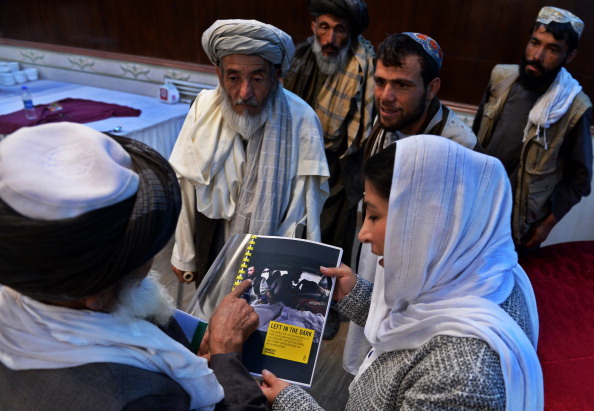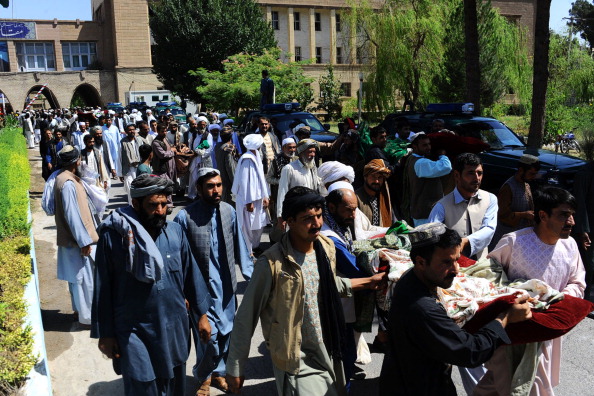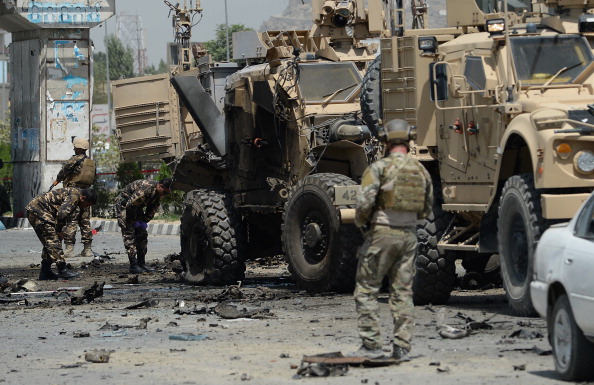
Afghan relatives of civilian victims of the country’s conflict examine the Amnesty International report detailing those killed by U.S. forces in the country at a press conference in Kabul on August 11, 2014. The families of thousands of civilians killed by American forces in Afghanistan have been left without justice or compensation. (Photo credit: Wakil Kohsar/AFP/Getty Images)
By Richard Bennett, Amnesty International’s Asia Pacific Director
In the early hours of September 16, 2012, a group of women from different villages in Afghanistan’s eastern Laghman province set out to collect firewood.
As they stopped to drink water by a small spring, a number of U.S. military planes appeared in the sky and started dropping bombs. Seven of the women were killed and another seven injured, four of them seriously.
The morning after, a NATO spokesperson told the media that “a large number of insurgents had been killed” in the airstrikes. The local villagers reacted furiously – they took the women’s bodies to the local district governor’s office, staging a protest against the killings.
Realizing their mistake, NATO was quick to offer a public apology. In a press release the day after, the organization promised a thorough investigation into the killing of the women: “Coalition forces take civilian casualties seriously.” After that, NATO fell silent about the incident.
Nobody outside of NATO knows if the promised investigation has been carried out or what it concluded. But it is clear that if there ever was an investigation, it did not involve any of the Afghan witnesses.
We interviewed some 125 witnesses, victims and family members, including many who had never given testimony to anyone before. Some of the cases involve abundant and compelling evidence of war crimes - yet no one has ever been held responsible for them.
According to one villager who lost three members of his family, “The American commander apologized for killing women and asked whether we wanted compensation, but we said, ‘No, we will not sell the blood of our martyrs.'”
Another villager simply said, “We don’t want any apology. We want revenge.”
This is far from an isolated case. Today, Amnesty International is releasing a new report that documents the almost complete lack of justice surrounding the killing of civilians by U.S./NATO forces in Afghanistan.
We examined in detail 10 cases between 2009 and 2013 where mainly U.S. forces were apparently responsible for civilian deaths, mostly through air strikes or night raids. At least 140 civilians were killed in these incidents, including pregnant women children and at least 50 children.
We interviewed some 125 witnesses, victims and family members, including many who had never given testimony to anyone before. Some of the cases involve abundant and compelling evidence of war crimes – yet no one has ever been held responsible for them.
Despite the thousands of Afghan civilians who have been killed since 2001 and the many thousands more who have been injured, prosecutions of US soldiers have been extremely rare. Afghan victims and family members have, by and large, been left without justice.

Afghan mourners and demonstrators carry the bodies of civilians allegedly killed in a NATO-led ISAF air strike in Herat on August 5, 2014. Afghan officials accused an ISAF airstrike of killing four civilians in the western province of Herat. (Photo credit: Aref Karimi/AFP/Getty Images)
The killing of civilians has been one of the main sticking points in the relationship between Afghanistan and the West, and has bred enormous resentment from both the Afghan government and general public.
It is true that international forces in Afghanistan have taken successful steps to reduce civilian casualties in recent years. In 2013, according to the U.N., international forces were responsible for 5 percent of all civilian deaths – Afghan forces accounted for 8 percent, and the Taliban and other armed groups for the overwhelming majority (74 percent).
But those steps should have been matched by an effort to improve accountability for the killings that do still occur. In the period that our report focuses on – 2009-2013, when the UN estimates that some 1,800 Afghan civilians were killed by international forces – Amnesty International is only aware of six cases where US soldiers have been prosecuted for civilian deaths in Afghanistan.
Actual investigations appear to be equally rare. The air strike in Laghman fits a familiar pattern – once shamed into acknowledging civilian casualties, the US military or NATO would often announce that an investigation would be carried out, only to then go completely silent. Family members and the general public are left in the dark.

U.S. soldiers part of NATO-led International Security Assistance force (ISAF) and Afghan security forces inspect the wreckage of an armored vehicle at the site of a suicide attack in Kabul on August 10, 2014. (Photo credit: Shah Marai/AFP/Getty Images)
Of the 125 witnesses we talked to, only two people had ever been interviewed by US military investigators.
At the heart of this problem is the deeply flawed U.S. military justice system. Essentially a form of self-policing, the U.S. military justice system relies on soldiers or commanders to report possible human rights violations themselves to trigger an investigation – but there are few incentives for them to do so, and they may risk ending up facing trial themselves for reporting abuses they had a role in.
Since U.S. troops are immune from prosecution in the Afghan court system, Afghans themselves have no way of lodging a criminal complaint. On those rare occasions when cases do make it to the prosecution stage, there are still serious concerns about the independence and transparency of the military courts – and the Afghan victims are rarely called upon to testify.
Our message to the U.S. government is clear – all cases involving civilian casualties at the hands of U.S. forces must be investigated, and those found responsible brought to justice. But this must be accompanied by fundamental reform of the U.S. military justice system, which is entrenching the current impunity.
The current lack of justice is leaving a dangerous legacy of resentment and impunity behind in Afghanistan. Most of the victims and family members we spoke to said they were desperate for justice more than anything else – the U.S. must not keep ignoring their pleas to see justice delivered.
They themselves said they wanted revenge, not justice. 'Justice delivered' will presumably involve on several occasions exonerating from wrongdoing a number of people directly involved in such incidents. Indeed military tribunal may well find there had been sufficient grounds to open fire in several if not many instances. What will be your response to such, just, verdicts? Or will you, too, want revenge?